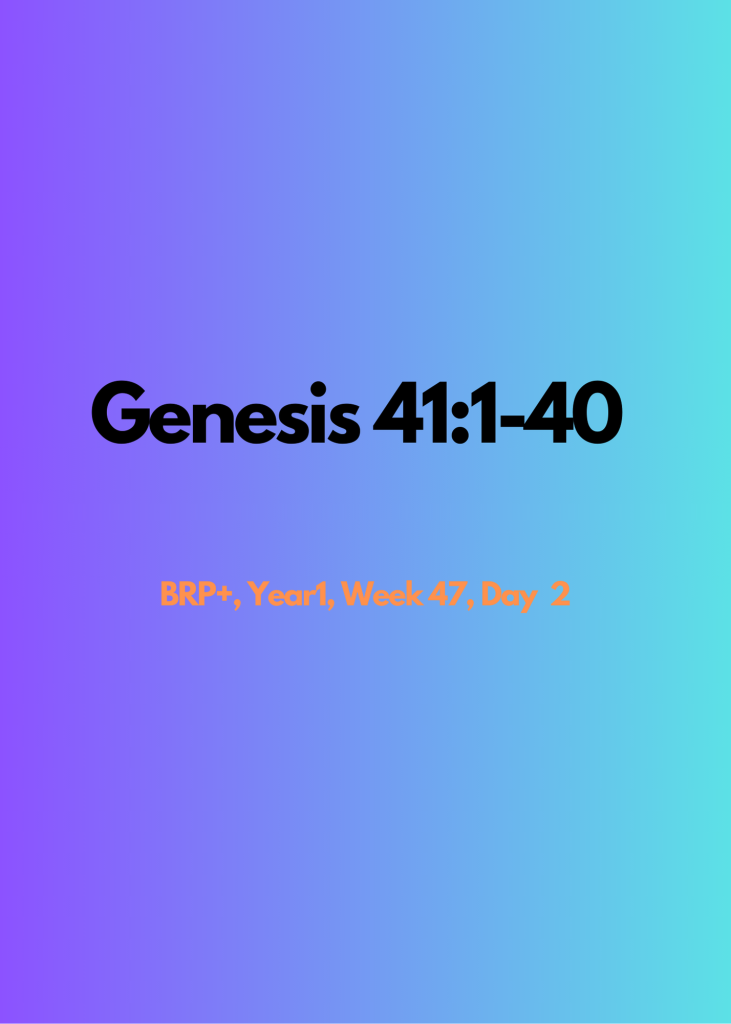Genesis 41:1-40
Q.1. Was Joseph forgotten? Why did Pharaoh seek for an interpretation of his dreams? Was anyone able to give the king an interpretation? – (Gen.41:1-8)
There is no indication that Joseph ceased serving faithfully. For two years he was forgotten by the chief cupbearer – but not by God. As always, God was faithful to the plans He had revealed to His servant (see Gen.37:5-9 c.f. Dt.29:29; Amos 3:7). In His good time, God gave Pharaoh two frightening dreams – Now in the morning his spirit was troubled, so he sent and called for all the magicians of Egypt, and all its wise men. And Pharaoh told them his dreams, but there was no one who could interpret them to Pharaoh (Gen.41:8).
Q.2. How did Joseph get involved with the king? To Whom did Joseph point for the answer? What troubled the king over his dreams? – (Gen.41:9-24)
As confusion reigned, the chief cupbearer suddenly remembered Joseph. He was an unlikely candidate – … a Hebrew youth was with us there, a servant of the captain of the bodyguard … (Gen.41:12). The cupbearer reluctantly recalled – and just as he interpreted for us, so it happened; he restored me in my office, but he hanged him (Gen.41:13). Joseph was hastily summoned. He shaved and changed his clothes then stood before Pharaoh (see Gen.41:14). Pharaoh recounted his two dreams of the seven cows and seven ears of wheat. What troubled the king about the fat and sleek cows, was that – when they had devoured them, it could not be detected that they had devoured them, for they were just as ugly as before … (Gen.41:21). The dream of the ears of wheat essentially had a similar outcome (see Gen.41:24). Yet – … there was no one who could explain it to me (Gen.41:24). Some of the greatest temptations can come through our giftedness (see 1 Cor.4:7). Pharaoh explained – 15 … “I have had a dream, but no one can interpret it; and I have heard it said about you, that when you hear a dream, you can interpret it.” 16 Joseph then answered Pharaoh, saying, “It is not in me; God will give Pharaoh a favourable answer” (Gen.41:15-16). The interpretation of Joseph made sense … and he humbly gave all the glory to God
Q.3. Why did God give Pharaoh his dreams? What was the message of the dreams? Why were they repeated? – (Gen.41:25-32)
Joseph unveiled God’s message to Pharaoh – … Pharaoh’s dreams are one and the same; God has told to Pharaoh what He is about to do (Gen.41:25 & 28). The empire was about to enjoy seven uniquely fruitful harvests. However, those years would be followed by seven years of extreme famine (see Gen.41:26-31). As for the repetition of the dreams – … it means that the matter is determined by God, and God will quickly bring it about (see Gen.41:32). Famines were not uncommon in Egypt. Beyond the obvious explanations, we too should see the hand of God upon local and world events and should remind ourselves of His sovereignty (see Gen.15:13-14).
Q.4. Was it unusual for Joseph to advise the king on how to deal with the looming crisis? How did Pharaoh respond? How do you explain the reversal of fortunes? – (Gen.41:33-40)
At only thirty years of age, Joseph was outstanding for his confidence and composure because he walked with God (see Gen.41:46). He, a Hebrew prisoner, was standing before the Pharaoh of the greatest empire on earth. Not only did he interpret the dreams, but he stood before Pharaoh and his court and advised them of what to do. Pharaoh was shaken. Joseph warned that the events were imminent, so – the proposal seemed good to Pharaoh and to all his servants (Gen.41:37 c.f. Gen 41:32). Joseph recommended – Now let Pharaoh look for a man discerning and wise and set him over the land of Egypt (Gen.41:33). The conclusion was obvious – So Pharaoh said to Joseph, “Since God has informed you of all this, there is no one so discerning and wise as you are (Gen.41:39). Pharaoh knew how to wield his power. He had had the chief baker hanged, and doubtless many more (see Gen.41:13). He acted decisively – You shall be over my house, and according to your command all my people shall do homage; only in the throne I will be greater than you (Gen.41:40). This reversal of fortunes happened in a single day, and so can ours … either in this life, or the one to come.

